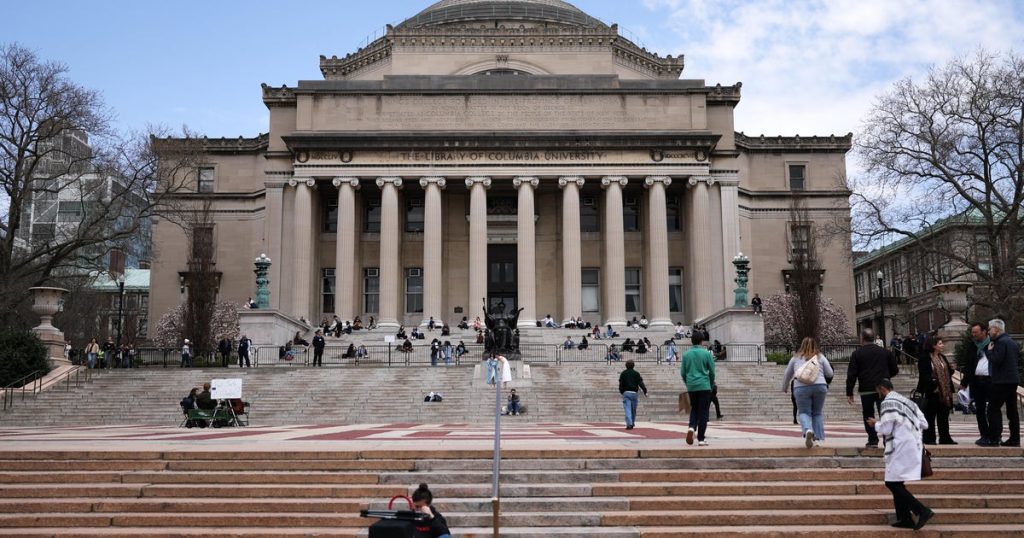The U.S. Department of Education announced that Columbia University has allegedly violated federal antidiscrimination laws, leading to potential repercussions for its accreditation status. According to the department, the university has not adequately addressed antisemitism on campus since the Hamas attack on Israel on October 7. This failure to comply with federal standards could jeopardize the institution’s eligibility for federal financial aid, as determined by the Middle States Commission on Higher Education.
| Article Subheadings |
|---|
| 1) Overview of the Allegations Against Columbia University |
| 2) Impact on Accreditation and Financial Aid |
| 3) University Response to the Department of Education |
| 4) Broader Implications for Higher Education |
| 5) Future Developments and Continuing Concerns |
Overview of the Allegations Against Columbia University
The Education Department’s civil rights office has initiated a formal review of Columbia University, citing significant concerns about its handling of antisemitism. Following the violent events in Israel on October 7, which involved an attack by Hamas, federal officials assert that the university has shown “deliberate indifference” towards the harassment experienced by Jewish students. Education Secretary Linda McMahon emphasized the severity of these accusations, stating that the university’s leadership must be responsive to the needs of its diverse student body. Specifically, she highlighted that the university’s actions (or lack thereof) in the aftermath of the attack have failed to protect the educational rights of Jewish students.
Impact on Accreditation and Financial Aid
The implications of these findings could be dire for Columbia University. The Middle States Commission on Higher Education holds the power to grant accreditation to institutions, influencing their ability to access federal financial aid programs. Losing accreditation would strip Columbia of its eligibility to offer federal student loans and Pell Grants, thereby affecting thousands of students who rely on such financial assistance. Columbia’s accreditation is essential not only for its financial health but also for maintaining its reputation as a leading educational institution. The Department of Education stressed the importance of accreditation bodies as “gatekeepers” for federal student aid, raising alarm over the ramifications of noncompliance.
University Response to the Department of Education
In contrast to the allegations made by the Education Department, Columbia University has publicly addressed the concerns raised. A university spokesperson acknowledged awareness of the Department’s issues and has indicated that the institution is actively engaging with the Middle States Commission to remedy these concerns. The spokesperson reiterated Columbia’s “deep commitment to combating antisemitism,” insisting that the university is taking significant steps to foster an inclusive campus environment. Moving forward, Columbia will likely need to provide detailed plans and tangible actions to demonstrate compliance and commitment to federal standards regarding student harassment and discrimination.
Broader Implications for Higher Education
The situation at Columbia University serves as a cautionary tale for institutions of higher learning across the United States. As antisemitism and other forms of discrimination become increasingly prevalent on campuses nationwide, the federal government’s response could set a precedent for how universities manage student safety and equity issues. There is growing scrutiny on whether colleges are prepared to address harassment effectively and foster a welcoming atmosphere for all students. The Education Department’s stance could potentially embolden students and advocacy groups to demand accountability from universities, encouraging more robust policies against discrimination.
Future Developments and Continuing Concerns
As this situation continues to unfold, the focus will remain on the actions taken by both Columbia University and the Education Department. Each step will be closely monitored by stakeholders including students, parents, and educators. Additionally, the role of accrediting bodies will be critical, as they navigate the complexities of ensuring compliance while promoting educational equity and excellence. How Columbia responds in the coming months, particularly regarding its engagement with federal authorities and its commitment to protecting all students, will be pivotal in determining its future. Moreover, the potential for similar investigations at other universities reflects a growing concern that may reshape higher education’s approach to addressing harassment.
| No. | Key Points |
|---|---|
| 1 | Columbia University is facing allegations of violating federal antisemitism laws. |
| 2 | The Department of Education indicates that the university may lose its accreditation. |
| 3 | The university claims to be responding to the Department’s concerns effectively. |
| 4 | The case could have broader implications for how universities handle discrimination complaints. |
| 5 | Ongoing developments will determine the future of Columbia’s financial aid and reputation. |
Summary
The ongoing scrutiny of Columbia University by the U.S. Department of Education highlights critical issues surrounding campus safety and discrimination. Allegations of inadequate responses to antisemitism post the October 7 attack have jeopardized the institution’s accreditation, bringing to light significant implications for the wider higher education landscape. As the university navigates its obligations to address these claims, the potential for loss of federal financial aid could affect thousands of students, illuminating the urgent need for comprehensive policies against discrimination in academic environments.
Frequently Asked Questions
Question: What prompted the Department of Education’s investigation into Columbia University?
The investigation was initiated due to allegations that the university failed to address antisemitism on campus after the October 7, 2023, attack by Hamas on Israel, leading to concerns about compliance with federal laws.
Question: What are the potential consequences for Columbia University?
The university risks losing its accreditation, which would make it ineligible for federal financial aid, affecting thousands of students who depend on loans and grants to fund their education.
Question: How is Columbia University responding to these allegations?
Columbia University has acknowledged the concerns raised by the Department of Education and claims to be actively working with the Middle States Commission on Higher Education to address these issues, emphasizing its commitment to combatting antisemitism on campus.


